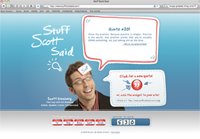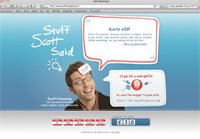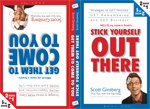 I write early.
I write early.
Usually four or five in the morning.
I don’t do this because I’m a morning person.
Just ask my family: You don’t want to KNOW me before about nine.
THE POINT IS: Writing (or any creative activity) early in the morning has nothing to do with preference. Discipline always trumps desire.
It’s all about positioning yourself in the best possible environment to leverage your creativity.
I am now going to make my case about the value of writing early:
1. It’s quiet in the most beautiful way possible. First, no external distractions. Not your kids. Not your dogs. Not your phone. Not your email. Not your self-constructed crazybusy schedule. And not the fear-mongering news anchors whose lifelong vocation is to scare the creativity and love out of you.
Second, no internal distractions. Not the voice of perfection. Not the echoes of people you’re trying to please. Not the endless demands of your readership. Not the incessant outreach from bloodsucking strangers who think they’re entitled to a free piece of you.
Not the scars of your past desperately trying to prevent your truth from surfacing. Not your ego scrambling to remind you that you’re not good enough to publish this thought.
Just quiet. Which means all you can hear is yourself. Which means there’s nothing or no one to stop you from bleeding your truth all over the page.
2. There’s no thinking. At 4am, it’s too early to think. Your brain hasn’t had its coffee yet. This is actually good, because your brain is a moron. Thinking is highly overrated. It’s more important that you write with your pen dipped in blood. (It’s infinitely more readable than grey matter anyway).
Here’s the deal: When it’s cold, dark and quiet – when the rest of world hasn’t rolled out of bed yet – you have no choice but to write from the gut. Or the heart. Or the chest. Or the diaphragm. Or the scrotum. Whatever. I don’t care. Pick a body part. Anything below the neckline will suffice.
The point is, when the sun isn’t up yet, you ALWAYS extract truth from the deepest parts of yourself. Superficiality not included. You unveil the truth that doesn’t require thinking. The truth that doesn’t require editing. You can’t edit blood anyway.
Remember: The darker it is outside, the brighter and clearer your thoughts are inside.
3. You initiate the launch sequence. It’s simple physics. The Law of Momentum. When you start writing early, you alter your creative trajectory by planting the seeds of movement. You’ll be amazed at how much momentum that one hour activates for the rest of the day.
Otherwise inertia destroys idea generation and cripples the execution thereof. After eight years as a professional writer, I’ve certainly had my share of off days. Occasionally, I won’t start writing until nine or ten. Not surprisingly, my creativity –m and the rest of my workday – suffers as a result. Happened to me on Monday, in fact. PIssed me off.
4. You ritualize your day. I’m a firm practitioner of rituals. Best way to honor the creative process. Two examples: First, I begin every day – EVERY day – with Julia Cameron’s Morning Pages. If you’ve never experienced this journaling exercise before, prepare to have your face rocked off. There is no better way – especially early in the morning – to clear away the crap that’s blocking your best ideas.
Secondly, I invoke The Muse with a beautiful set of incantations I learned from Eric Maisel’s Ten Zen Seconds. This is another form of spiritual preparation. I don’t know what I’d do without it. (And if you don’t think writing is a spiritual practice, email me immediately.)
Even if you’re not a writer, ritualizing the beginning of your day is essential for living a creative life.
REMEMBER: Successful writers start early.
Your day is waiting.
LET ME ASK YA THIS…
What time did you start writing today?
LET ME SUGGEST THIS…
For the list called, “9 Things Every Writer Needs to Do Every Day,” send an email to me, and you win the list for free!
* * * *
Scott Ginsberg
That Guy with the Nametag
Author, Speaker, Coach, Entrepreneur
[email protected]
 Need to build your Thought Leadership Platform?
Need to build your Thought Leadership Platform?
Perhaps my monthly (or yearly) coaching program would help.
Rent Scott’s Brain today!

 As the evil killer lunges towards Watson’s neck, Sherlock Holmes grabs the arm of his attacker, stopping the invisible dagger millimeters before slicing the jugular of his faithful companion.
As the evil killer lunges towards Watson’s neck, Sherlock Holmes grabs the arm of his attacker, stopping the invisible dagger millimeters before slicing the jugular of his faithful companion. Probably the most frequently asked question I get about writing and creativity is the issue of discipline.
Probably the most frequently asked question I get about writing and creativity is the issue of discipline. 1. 80% of life isn’t showing up – it’s FOLLOWING THROUGH. That you show up is eclipsed by the importance of HOW you show up. People respond to the sum total of what you present to them. Positively, negatively, or not at all. It all depends on
1. 80% of life isn’t showing up – it’s FOLLOWING THROUGH. That you show up is eclipsed by the importance of HOW you show up. People respond to the sum total of what you present to them. Positively, negatively, or not at all. It all depends on 
 1. Writing is blood in disguise. Sit down, slice open a vein a bleed your truth all over the page. That’s my official definition of writing. And after publishing ten books and a thousand articles, here’s what I’ve discovered: Writing in blood is a huge time saver.
1. Writing is blood in disguise. Sit down, slice open a vein a bleed your truth all over the page. That’s my official definition of writing. And after publishing ten books and a thousand articles, here’s what I’ve discovered: Writing in blood is a huge time saver.  Who’s quoting YOU?
Who’s quoting YOU? Email spam – while annoying, unethical, sexually graphic and a colossal time waster – IS quite entertaining.
Email spam – while annoying, unethical, sexually graphic and a colossal time waster – IS quite entertaining. Who’s quoting YOU?
Who’s quoting YOU? 1. Don’t go where the money is – going where the money is going. Think Gretzky: He always skated where the puck was going. 1,016 goals later, the entire world calls him – and ONLY him – The Great One. This is not coincidence. Just strategy. Anticipatory thinking. It’s predicting the future. Are you thinking ten years out?
1. Don’t go where the money is – going where the money is going. Think Gretzky: He always skated where the puck was going. 1,016 goals later, the entire world calls him – and ONLY him – The Great One. This is not coincidence. Just strategy. Anticipatory thinking. It’s predicting the future. Are you thinking ten years out? 1. What techniques can you suggest for getting ideas out of your head and linking them? First, write
1. What techniques can you suggest for getting ideas out of your head and linking them? First, write  Scott’s mentoring program helps entrepreneurs, businesspeople, artists and writers around the world take their ideas and execute them into “I dids.” But instead of reading a bunch of fluffy testimonials, see what a few of clients actually did:
Scott’s mentoring program helps entrepreneurs, businesspeople, artists and writers around the world take their ideas and execute them into “I dids.” But instead of reading a bunch of fluffy testimonials, see what a few of clients actually did: The world’s FIRST two-in-one, flip-flop book!
The world’s FIRST two-in-one, flip-flop book!